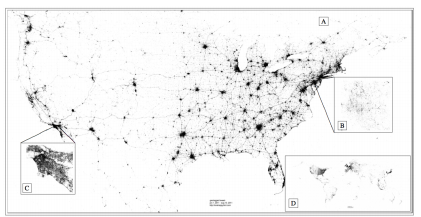Twitter Happiness Levels Soar As People Travel Further From Home
The way sociologists and anthropologists study modern society has changed dramatically in recent years. One of the major advances has been the ability to study human behaviour by mining the massive databases from technologies such as mobile phones and social media, such as Twitter. These technologies provide a firehose of near real-time data about people’s ideas, location and even their feelings.

That’s enabled entirely new insight into the way society behaves. Today, Morgan Frank and pals at the University of Vermont take this work a step further by analysing how the sentiments people express over Twitter change as they move further afield.
Their surprising conclusion? “Expressed happiness increases logarithmically with distance from an individual’s average location,” they say. In other words, the further away we are, the happier we become, as measured by the sentiments of our Tweets.
Frank and pals analysed 37 million Tweets from 180,000 individuals in 2011 that also gave their location. They then characterised the movement associated with each individual.
They found that most people Tweet largely from two locations which Morgan and co callworkandhome. That’s a result that others have also found.
However, they also measured the average distance that each Twitter user travelled according to their geolocation data. They found that people in cities tend to travel over a larger area than people who live in less densely populated areas.
Finally, they measured the sentiment of each Tweet, using an established scale of happiness associated with common words. Their most interesting result comes from determining how this sentiment changes with distance from a user’s average location.
The results are fascinating. Morgan and co say that Tweets authored thousands of kilometres from from an individual’s expected location are more likely to contain the words “beach”, “great”, “restaurant” and so on and less likely to contain negative words such as “no”, “don’t”, “hate” and the suchlike.
However, when people are closer to their average location, they are more likely to laugh using words like “hahaha”.
In fact,Morgan and co say the biggest difference in expressed happiness levels is the result of the reduced use of these negative words when further from home.
Of course, an important caveat is that expressed happiness is not the same as actual happiness.But nevertheless, this kind of analysis clearly gives sociologists an unprecedented new window into the human psyche.
Ref:arxiv.org/abs/1304.1296:Happinessand the Patterns of Life: A Study of Geolocated Tweets
Keep Reading
Most Popular
Large language models can do jaw-dropping things. But nobody knows exactly why.
And that's a problem. Figuring it out is one of the biggest scientific puzzles of our time and a crucial step towards controlling more powerful future models.
How scientists traced a mysterious covid case back to six toilets
When wastewater surveillance turns into a hunt for a single infected individual, the ethics get tricky.
The problem with plug-in hybrids? Their drivers.
Plug-in hybrids are often sold as a transition to EVs, but new data from Europe shows we’re still underestimating the emissions they produce.
Google DeepMind’s new generative model makes Super Mario–like games from scratch
Genie learns how to control games by watching hours and hours of video. It could help train next-gen robots too.
Stay connected
Get the latest updates from
MIT Technology Review
Discover special offers, top stories, upcoming events, and more.